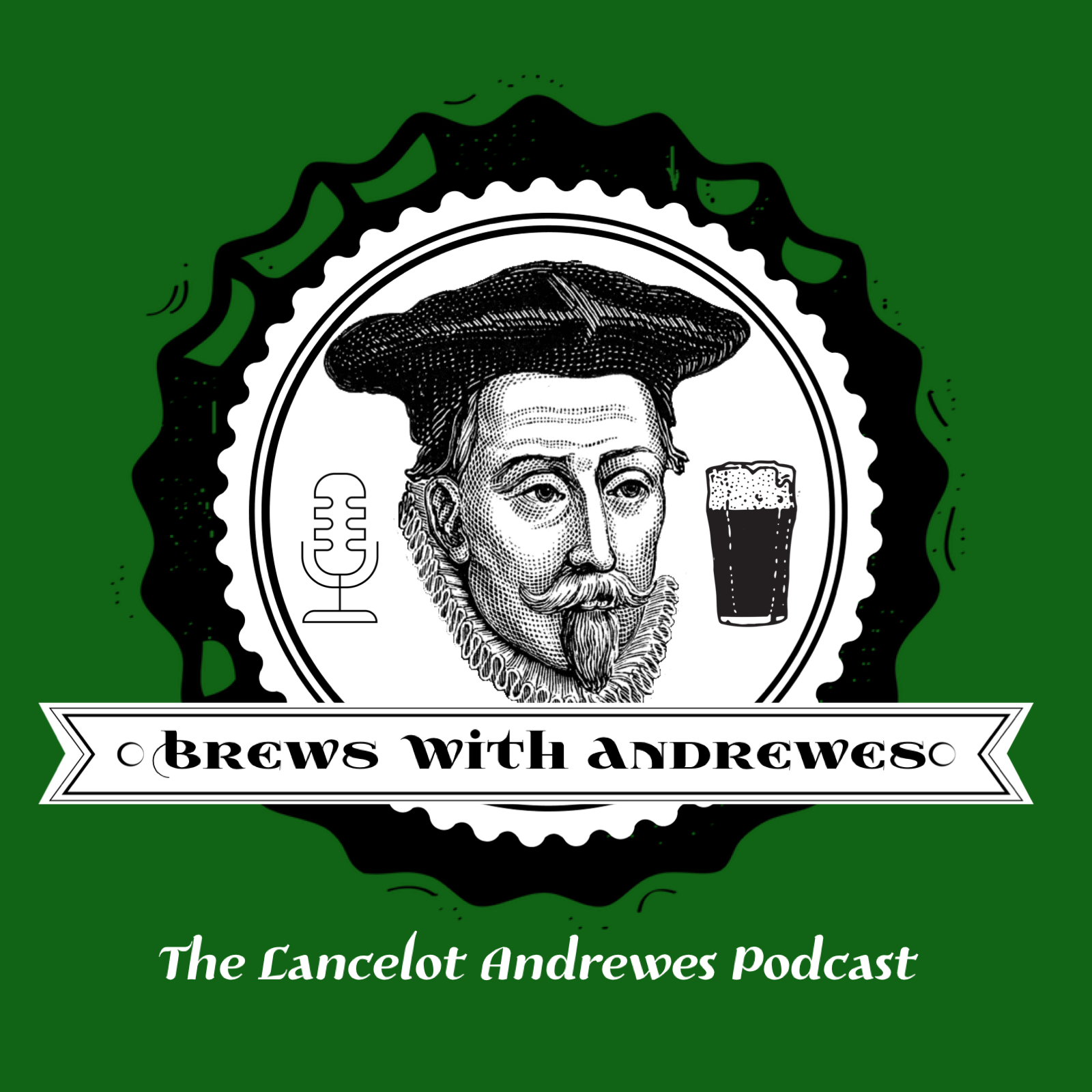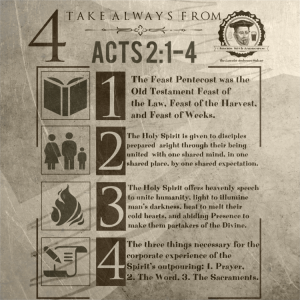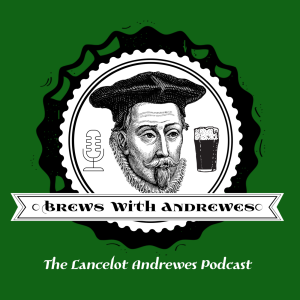
1.1K
Downloads
12
Episodes
What would it be like to grab a brewski with Bishop Lancelot Andrewes? Fr. Michael and Fr. Allen of St. Michael the Archangel Anglican Church Charolette invite you to the table for a drink and to discuss the works of this quintessential Anglican and famous Caroline Divine in order to see what he would have to say about the world in which we live.
Episodes

Monday Jun 22, 2020
Episode Two: Bishop Andrewes and the Outpouring of the Spirit in Acts 2:14
Monday Jun 22, 2020
Monday Jun 22, 2020
Sermon 1 in Lancelot Andrewes' Sermons on the Sending of the Holy Ghost Preached upon Whit-Sunday preached before the King's Majesty at Greenwich on June 8, 1606.
A copy can be found in Lancelot Andrewes Works, Sermons, Volume Three pp.107-129 or on The Project Canterbury Website.
With this sermon, Bishop Andrewes examines the sending of the Holy Ghost as accounted by St. Luke in Acts 2:1-4, looking first at the time and manner of the Holy Spirit’s coming upon the Apostles and then concluding with the three things necessary for believers today to share in the blessing of the Spirit’s outpouring. The simple outline is as follows:
- Introduction of Acts 2:1-4 (Paragraphs 1-7; 8-16)
- The Time of the Spirit’s Coming (Paragraph 17)
- The Original day of His coming was known for the Feast of Pentecost; the Feast of the Law; the Feast of Harvest; and the Feast of Weeks (Paragraphs 18-22)
- St. Chrysostom saw this as the fulfillment of the Feast of harvest as the Apostles were putting their first sickle to the great harvest (Paragraph 21)
- St. Augustine say Pentecost [50th day] as a fulfillment of the Jubilee promise [50th year] forgiving debts and restoring men to their first estates (Paragraph 22)
- St. Cyril saw the emission of the Spirit at Pentecost as the renewal of what was lost by sin of the first emission of the Spirit into Adam whereby starting the process of the new creation (Paragraph 23)
- The Manner of the Spirit’s Coming
- The Disciple’s Part (Paragraphs 24-35)
- To whom the Spirit Came
- How they stood prepared
- How they were found framed and fitted to receive Him
- The Spirit’s Part (Paragraphs 36-93)
- How His coming was demonstrated by sounds and sights
- How it was explained by both:
- An inward filling by the Spirit’s truth, and
- Outward deeds of the manifestation of speaking in tongues.
- The Disciple’s Part (Paragraphs 24-35)
- Conclusion: Three things necessary to experience the outpouring of the Holy Spirit (Paragraphs 94-107)
- Prayer (cf.Acts 4:31)
- Word (cf.Acts 10:44, Apostle’s teaching)
- Sacrament (cf. Acts 19:6, laying on of hands/ see also breaking of bread 2:42-47)
Brews of the Week: Fr. Allen had a Vanilla Coffee Blonde (VCB) Ale by Cabarrus Brewing and Fr. Michael had his old faithful Guinness Draught

Tuesday Jun 02, 2020
Episode One: Why Lancelot Andrewes?
Tuesday Jun 02, 2020
Tuesday Jun 02, 2020
Why Andrewes?
Bishop Lancelot Andrews was a gifted preacher and translator of the Bible (without him the KJV Bible would not be what it is); a defender of the ancient, Biblical faith (without him the Anglican Church would not have bishops); an exemplary spiritual leader and man of prayer (leaving us his masterful “Spiritual Devotions”); and a practical Biblical theologian (as can be seen in his “A Pattern of Catechistical Doctrine”).
- Bishop Andrewes was Gifted Preacher and Translator (without him the KJV Bible would not be what it is)
- He was one of King James’ favorite preachers because of his eloquence
- He was the primary editor of the King James Bible’s Genesis-1&2 Kings and General Editor of the rest
- From Fr. Michael's Thesis, "Lancelot Andrewes' Life and Ministry": "A review of this work gives a great insight into the life and ministry of Andrews as it seems that ‘words’ are never enough when it comes to God” (p.21).
- He was one of the leading figures of the group of Anglican theologians and preachers known as the Caroline Divines.
- He was a Defender of the Ancient Faith (without him the Anglican Church would not have Bishops)
- Both practical and pastoral, Andrewes’ theology recorded in both his sermons and other works came to shape Anglicanism into what it is today, especially in regards to Bishops. As a Bishop, he saw himself not only as an “Anglican” bishop, but a Bishop in the One, Holy, Catholic, and Apostolic church. Being in continuity with early church was a necessity for Andrewes.
- Andrewes sought to be in communion with the Catholic Church in all times and all places and to return to the fundamentals of Christianity itself:
- Fr. Michael Thesis: “His prayer life, doctrine, and liturgy all shared a commonality of discipline, based upon scripture and early church tradition. He sough not new ideas and interpretations but the foundation of the early church” (p.1).
- “He understood that the Reformation was necessary because of the corruption of the Roman Church and believed that the new direction should be guided by a return to the practices and doctrines of the early church enshrined by the first four councils” (p.12).
- “The Christian faith as explained by Andrews, is ‘one cannon given of God, two testaments, three symbols (Apostles’, Nicene, and Athanasian Creeds), the four first councils (of Nicaea I: 325; Constantinople I: 381; Ephesus: 431; Chalcedon: 451), and first five centuries and the series of Fathers therein” (p.13).
- He promoted “the idea of Catholicism that was episcopal, but not papal” (p.15).
- “Andrewes decided to look backwards in order to move forward. As the Church has always had its divisions and heresies, he searched the ‘ancient Fathers and lights of the Church, in whom the scent of this ointment was fresh, and the temper true on whose writings it lieth thick and thence strike it off and gather it safely’” (p.77).
- He wanted to restore the original practices of Christ and the church
- Fr.Michael Thesis: “If something such as the cross, was abused to superstition in time of popery, it must have been well used before that time. Thus, the abuse of the Pope did not make something that was good and proper become something unsavory of itself” (p.20).
- Responding apologetically to Cardinal Bellermine’s Responsio ad Librum: Triplici nodo, triplex cuneus (1608) Andrewes “continues a theme of walking a path which the early fathers of the church traveled” (p.60).
- “Andrews argued against Cardinal Bellermine that it was the Roman Catholic Church who had changed the early church teaching thus contracting ‘much filth’ that caused much suffering for those of the catholic faith. By changing the sacraments and their meanings, the Roman Church had been the ones who were innovating and Andrewes argued that it was the Anglican Church who renovated what was customary with the ancients (The early Church) (p.99).
- He was a monumental Spiritual Leader and Man of Prayer (Spiritual Devotions)
- Fr. Michael Thesis: “Lancelot Andrewes helped guide the Church of England during the early post-Reformation period. He is famous for both his prayers and his sermons as they reflect holiness of life” (p.2).
- His now-published devotions have modeled how to both pray the Scriptures as well as draw close to Jesus.
- Fr. Michael Thesis: “The example-of-Christ theme has been used by others as a guide by other Anglicans; for if the Lord does, so should his followers. The command to “pray” came from Jesus thus it is not a choice to make, by telling all to ‘pray’ it is Jesus that binds us to prayer. It is not an option” (p.35). “Andrewes’ adherence to the Daily Offices of Morning and Evening Prayer” grows out of this observation (p.97).
- “As revealed in his sermons on the Lord’s Prayer, Andrewes believed that prayers should be structured” (p.85).
- “Andrewes links prayer with fasting and alms giving: and these three to offer to God our soul by prayer our body by abstinence and (thirdly) our goods by alms, deeds had been ever counted the triple or threefold” (p.86)
- T.S. Eliot came to love Andrewes for his spiritual writings and considered him somewhat of a spiritual mentor. In his later poetry, Eliot quotes Andrewes more than any other source and said that Andrewes’ English Catholicism was the only form of Anglicanism he wanted to espouse.
- He strove to see his neighbor as God made them, rather than seeing their sin-made selves
- Fr. Michael Thesis: “Take heed we take not the sin of our neighbor for our neighbor, for every sinner, as he is a sinner, is to be hated; every man, as he is man, is to be loved: let us love men so that we love not their sins, and love them for that which God made them, not that which by sin (the breaking of the Commandments) they made themselves” (p.51).
- He was a Practical Biblical Theologian (A Pattern of Catechistical Doctrine; and Real Presence in Ad Apolgiam Cardinalis Bellarmini)
- His doctrine of the Incarnation is always front and center and occupies the largest part of his theology: In Christ, man and God were united which paved the way for our reconciliation and union with God. Participation in the divine Nature was the ultimate end-state of the Incarnation.
- Fr. Michael Thesis: “Andrewes’ doctrine [of the Eucharist] could be described as the Word flowing into and through the Eucharist feeding all who partake of it worthily… Andrewes has a high view of the Eucharist and of the real presence of Christ” (p.67,68).
- “He viewed the Eucharist not only as a communion between those with the Church, but also as a communion of unity between God and Man” (p.90).
- “The kernel of grace is planted in us by the participation of the body and the blood of Christ; of which kernel comets a tree, which bringeth forth the fruits of holiness and righteousness in our whole life… Which God will in due time reward with the Crown of life and glory in the world to come” (p.91).
- “Although he confirmed the two sacraments given by Christ, he did not dismiss the other five sacraments of the Anglican Church” (Holy Unction, Confirmation, Confession, Holy Orders, Holy Matrimony) (p.91).
- He had a High view of the Holy Spirit: Through the Holy Spirit Christ was conceived, the Church is constituted, and Christ’s presence is communicated to us in the Sacraments
- Fr. Michael Thesis: “Anselm decades earlier had tried to describe God (the ontological debate), but Andrewes would always strive to make God as personal as possible in his sermons, prayer life, and liturgy as a way of encouraging people to come to Him” (p.21).
- “Andrewes’ life implies that he believed that all senses must be on Christ, not just ears as of hearing a sermon, and by thus doing so be drawn near to Him in worship” (p.63).
- “To be ‘truly called in the heart,’ according to Andrewes there must be an urging, a motivating desire, a love of godliness and even a hatred of sin within one’s whole self” (p.83).
- “He did not invent doctrine but relied on the scripture, allowing the scripture to speak of itself as interpreted by Christ’s Church” (p.42).
Fr. Michael's Thesis: "Lancelot Andrewes' Life and Ministry"
Music & Sound Attributions:
Music in this episode by Blue Dot Sessions “Lost Shoe” (www.sessions.blue). Sounds used are as follows: “Beer Can Opening” recorded by Mike Koening found at (http://soundbible.com/216-Beer-Can-Opening.html) and “Pouring Drink” recorded by Mike Koenig found at (http://soundbible.com/2115-Pouring-Drink.html)
